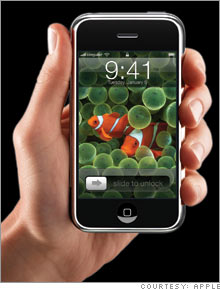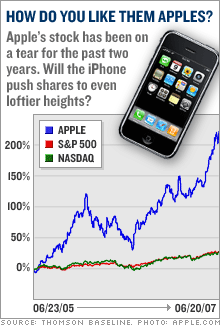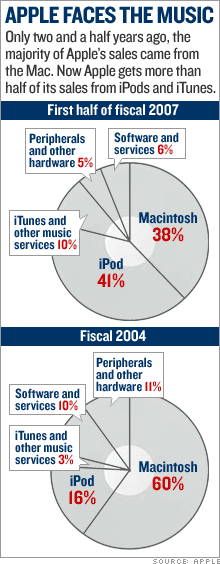iPhone set to ring up profitsStock Spotlight: Investors think the iPhone will be Apple's newest consumer gadget hit. But is it too late to buy the stock?NEW YORK (CNNMoney.com) -- Few companies generate the kind of excitement before a product launch as Apple has before the debut of its eagerly awaited iPhone on June 29. Consumers -- not to mention many tech writers and investors -- expect the iPhone to be a superior, standard-setting device. In other words, the iPod of cell phones. "Apple thinks there's an opportunity to reinvent the way people use a handheld device," said Harry Blount, an analyst at Lehman Brothers. "It can be a handset, an MP3 player, potentially a GPS device. It could morph into an e-commerce application." Apple has a lot riding on the iPhone as the company continues to branch out from its roots as a computer maker. The company has sold 100 million iPods since the product's debut in November 2001. Apple's (Charts, Fortune 500) transformation to a consumer electronics giant under CEO Steve Jobs has yielded fat profits for the company and rewards for shareholders. Shares of Apple have surged 212 percent in the past two years, trouncing both the broader market as well as the Nasdaq. But with so much promise in the air, the risk of "unprecedented" hype about the iPhone is great, said Van Baker, an analyst with technology research firm Gartner. "If it does anything less than walk on water it will be considered a failure," said Baker, adding that the trick for Apple will be to convince people who are not hardcore Apple fans to buy the iPhone. Hang up on the hype Jobs has predicted the iPhone will sell 10 million units by the end of 2008. No one doubts the slim white, GSM phone, equipped with Wi-Fi, a 3.5 inch screen, and built-in iPod looks good. And Apple has dug in deep to make technological improvements such as voicemail that can be sorted like email. But the main question hanging over its release is how well all consumers - and not just Apple loyalists - will respond. Analysts see the battery life, the lack of a keyboard and price as possible sticking points. It's also going to be available from just one carrier, AT&T (Charts, Fortune 500). In mid-June the company announced that the iPhone's battery life will last longer than originally expected: 8 hours of talk time, 6 hours of Internet use, 24 hours of audio playback. Analyst Shaw Wu of American Technology Research says the battery life is "decent." But the iPhone doesn't have a removable battery either, which could be a problem. Wu explains that while an iPod is just used as an iPod; the iPhone "will be used for multiple functions" including, presumably, business matters that can't wait should a battery fail. The iPhone's user interface will use the battery, too. "It's constant interaction," said Wu. "Every time you use it, it sucks up battery life." As for the lack of a keyboard, virtual keys appear on the touch screen. Wu said he's heard that the there is a "learning curve." If it's too obtuse, potential buyers could be put off. The cost of the iPhone is above the industry average, too. The iPhone will come with 4 gigabytes or 8 gigabytes of memory, priced initially at $499 or $599. That's on the high side for handheld devices and far above what most consumers pay for cell phones. Analyst Hugues De La Vergne, also of Gartner, estimates 70 to 80 percent of cell phones in the U.S. are sold for less than $100 due to incentives consumers get from wireless service providers. And if consumers balk at the high price, that could hurt Apple since Lehman's Blount says the consumer electronics market is expected to grow two to three times faster than the corporate hardware market over the next four years. Remember the Mac? Given the focus on the iPhone and the fact that iPods and other music products now account for a majority of Apple's sales, it's easy to forget that until not so long ago, Apple was known mainly as a computer maker. And Macs are still an important part of Apple's growth. Thanks to the iPod's success, Apple has enjoyed a modest increase in computer market share during the past few years, from 3.2 percent in 2003 to 4.7 percent last year, according to information from Bear Stearns. Apple analysts and industry watchers have made much of the so-called "halo effect," where satisfied iPod owners have decided to switch from PCs to Macs. Thomas Telford, a portfolio manager at investment management firm American Century, who oversees a tech fund that holds shares in Apple, said he thinks Apple's computer market share could grow to 10 to 15 percent in the next five years. And with all the hype on the iPhone, the Mac isn't the only Apple product that's getting lost in the shuffle. Another new offering from Apple, the Apple TV, also hasn't received a lot of attention. Apple is hoping to win the battle for the living room with Apple TV. That device, which was released in March and sells for $299, allows users to play movies, TV shows, music and podcasts from their iTunes library on their TV. It can hold up to 200 hours of video, 36,000 songs or 25,000 photos. Apple TV could be an important part of the company's overall digital entertainment strategy. But the sales haven't exactly gone through the roof since its debut. Jobs called Apple TV a "hobby" rather than a business at a recent industry event and said that at this point it expects to sell hundreds of thousands, rather than millions, of units per year. A "core" holding Apple's stock has been trading above $100 since the beginning of May, and has moved up steadily into the $120 range in anticipation of the iPhone's roll out. The stock trades at 35 times earnings estimates for fiscal 2007, which ends in September. That may seem pricey until you factor in the fact that earnings are expected to grow an eye-popping 56 percent this year and 21 percent, on average, a year for the next five years, according to estimates from Thomson/First Call. Apple trades at a premium to most of its major rivals but due to its unique product mix, it's a little unfair to compare it directly with say, computer makers HP (Charts, Fortune 500) or Dell (Charts, Fortune 500) or handheld manufacturers Nokia (Charts), Motorola (Charts, Fortune 500) and Research in Motion (Charts). Plus, earnings estimates may wind up being too low. Analysts currently expect profits to increase by only about 15 percent next year in fiscal 2008. Part of that is due to Apple's typically conservative guidance -- the company has surpassed consensus earnings estimates by 31.6 percent, on average, for the past four quarters. But the growth slowdown from 2007 to 2008 is also a reflection of the fact that no matter how successful the iPhone may be, Apple will recognize its revenue on a subscription basis, which will smooth out its profits. Given the stock's big run ahead of the iPhone launch, there's a good chance there could be some profit taking once it finally hits stores. And with expectations running so high, some kind of negative press seems almost inevitable. That could also hit the stock. To that end, Telford of American Century says the iPhone launch could be followed by shortages or long waiting lists. That, he predicts, could cause the stock to pull back. But based on Apple's history of positive earnings surprises, it seems like any dip in the stock is probably a good opportunity to buy. None of the analysts quoted personally own Apple stock but Bear, Stearns & Co. does non-investment banking with Apple and is a market maker in its stock. Lehman Brothers Inc. has an investment banking relationship with Apple Computer and makes a market in its stock. American Technology Research does not have a banking relationship with Apple. |
|




